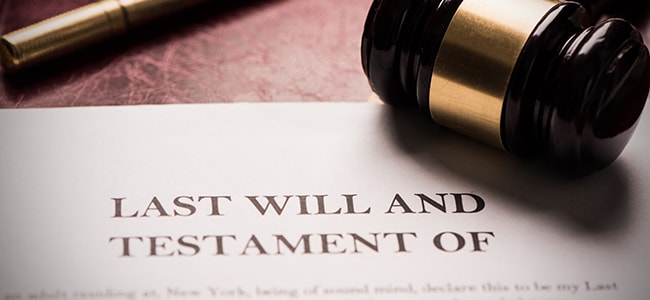Probate Law Center

Probate is the process of managing and distributing the assets in a decedent’s estate. The probate process is usually led by an executor (also known as an administrator or personal representative). An executor’s duties include finding and organizing important estate documents, maintaining the estate’s assets, valuing and distributing those assets, communicating with beneficiaries, creditors, or other interested parties, and working with the probate court. The time that an executor spends administering an estate may be influenced by whether an interested party initiates probate litigation or whether the estate contains assets transferable outside probate.
Probate Administration
An executor, administrator, or personal representative manages and transfers a decedent’s assets through a process known as probate administration. Executors may be nominated in a will or appointed by the probate court. During the formal probate process, the executor proves the validity of the decedent’s will to the court, settles creditor claims, and transfers assets to beneficiaries or heirs according to a will or other estate planning documents and state law.
In addition to formal probate proceedings, many states offer informal probate and small estate procedures under which the probate court takes a limited role. However, probate court involvement may be useful or necessary if the executor must ask the court to rule on questions of intestate succession or determine how certain events affect a will’s terms. Probate court involvement may also be unavoidable if the estate contains property that must pass through probate in a state other than the state in which the decedent was domiciled through a process known as ancillary probate.
Probate Litigation
Most probate proceedings are uncontested and progress without issue. However, if disputes arise during probate administration, an interested party may initiate probate litigation. Disputes addressed through probate litigation may include:
- Will Contests
- Litigation Against the Executor
- Disinheritance and Surviving Spouses’ Rights
- Will Construction and Interpretation Litigation
- Creditor Claims Against Estates
- Trust Contests
- Reformation and Modification of Trusts
- Litigation Against a Trustee
- Guardianship Administration and Litigation
An interested party cannot initiate probate litigation simply because they do not like a fiduciary, such as the executor, or they do not like the way in which estate assets are being handled. For example, a party filing suit against an executor generally must either object to estate accountings, dispute the executor’s fees, or allege that the executor has breached their fiduciary duty. A party contesting a will must typically allege that the will is invalid due to undue influence, a lack of testamentary capacity, improper execution, fraud, or mistake. However, probate litigation may be helpful if an interested party fears that a fiduciary’s actions are harming the estate or if an estate planning document, such as a will, does not conform with the author’s intent. Furthermore, certain beneficiaries, heirs, and creditors may initiate probate litigation to protect their rights with respect to the estate.
Transferring Property Outside Probate
Probate court proceedings may be simplified or eliminated if the decedent’s estate contains assets transferable outside probate. Often, the process for transferring eligible property outside probate is straightforward and may be achieved with minimal executor involvement, if any. Assets and types of ownership that avoid probate proceedings include:
- Trusts
- Assets With Designated Beneficiaries
- Gifts of Property
- Joint Ownership With Right of Survivorship
Assets transferable outside probate may vary by state. For example, some states allow a vehicle owner to register the vehicle with a transfer-on-death (TOD) beneficiary. If a vehicle has a TOD designation, the beneficiary may only need to reregister the vehicle in their own name to complete the transfer. Some states also offer TOD deeds for real estate. Other assets that commonly have designated beneficiaries include retirement accounts, life insurance plans, bank accounts, and securities, such as stocks and bonds.